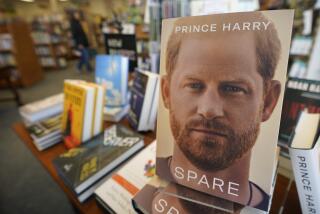Pirates Go After Harry Potter
- Share via
BEIJING — The wizards of China’s thriving piracy industry have worked their magic again and produced a rush translation of the latest Harry Potter book.
Although it’s missing some paragraphs and gets a couple of facts wrong, an unauthorized Chinese version of “Harry Potter and the Half-Blood Prince” was on sale Sunday in Beijing, just two weeks after the book appeared in English and almost three months ahead of the planned launch of the official Chinese-language edition.
Impatient Chinese fans also have begun posting their own translations online. One reader was so upset about the ending he wrote his own and posted it on a university website.
The fantasy series by J.K. Rowling is wildly popular in China, where the hero is known as “Ha-li Bo-te” and authorized translations of five earlier books have sold millions of copies. In 2002, an unknown Chinese author produced an entire fake adventure, “Harry Potter and Leopard-Walk-Up-To-Dragon.”
Chinese leaders, under pressure from the U.S. and other trading partners, have promised repeatedly to stamp out the country’s rampant piracy of goods such as books, movies, drugs and designer clothes. But such fakes are still widely available, and foreign companies say they are losing billions of dollars in potential sales.
A Chinese-character softcover version of the newest Harry Potter installment was being sold off a tarp in an underpass in downtown Beijing for 20 yuan, or $2.50, while the official English-language hardcover books sell in Beijing for the equivalent of $21. The saleswoman would not say where she got the book but said she had been selling copies since Friday.
The fake book looked identical to the first five tales put out by People’s Literature Publishing House, the mainland firm that purchased the rights to publish Harry Potter in Chinese. However, several pages of action are missing and there are some crucial mistranslations, such as using the word “immortal” at one point when the original says “mortal.”
The earlier authorized translations were produced by a team of veteran children’s book translators. Pirated versions of those books and the movie spinoffs are widely available in China.
The People’s Literature Publishing House plans to launch the official Chinese version of the new book Oct. 15, the Beijing Daily Messenger newspaper reported Sunday.
In 2003, the publisher tried to beat pirates to market by rushing out its own translation of Rowling’s previous book, “Harry Potter and the Order of the Phoenix,” 10 days before its scheduled release.
At that time, the company offered a reward for reporting piracy, but it was not clear whether it caught any copycats. A spokesman for Rowling’s London agent, Christopher Little, said two weeks ago the agent had successfully taken action against Chinese pirates but declined to give details.
China is regarded as the world’s biggest source of illegally copied goods as varied as Hollywood movies, Microsoft Corp. software, Ralph Lauren designer shirts and Callaway golf clubs.
Estimates of potential lost sales to legitimate producers worldwide range from $16 billion to as much as $50 billion a year. China’s own producers of music, software and other goods say they also suffer huge losses.
In response to complaints from its trading partners that fines were too light to deter pirates, China has begun imposing jail time for violations.
More to Read
Sign up for our Book Club newsletter
Get the latest news, events and more from the Los Angeles Times Book Club, and help us get L.A. reading and talking.
You may occasionally receive promotional content from the Los Angeles Times.





